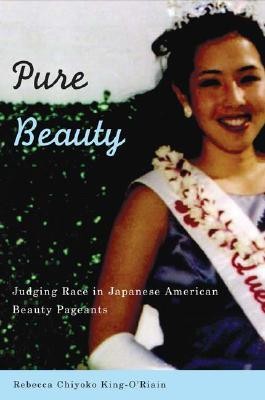
- We will send in 10–14 business days.
- Author: Rebecca Chiyoko King-O'Riain
- Publisher: University of Minnesota Press
- ISBN-10: 0816647909
- ISBN-13: 9780816647903
- Format: 14.9 x 22.8 x 1.6 cm, softcover
- Language: English
- SAVE -10% with code: EXTRA
Reviews
Description
With a low rate of immigration and a high rate of interracial marriage, Japanese Americans today compose the Asian ethnic group with the largest proportion of mixed-race members. Within Japanese American communities, increased participation by mixed-race members, along with concerns about overassimilation, has led to a search for cultural authenticity, giving new answers to the question, Who is Japanese American? In Pure Beauty, Rebecca Chiyoko King-O'Riain tackles this question by studying a cultural institution: Japanese American community beauty pageants in San Francisco, Los Angeles, Seattle, and Honolulu. King-O'Riain employs rich ethnographic fieldwork to discover how these pageants seek to maintain racial and ethnic purity amid shifting notions of cultural identity. She uses revealing in-depth interviews with candidates, queens, and community members, her experiences as a pageant committee member, and archival research--including Japanese and English newspapers, museum collections, private photo albums, and mementos--to establish both the importance and impossibility of racial purity. King-O'Riain examines racial eligibility rules and tests, which encompass not only ancestry but also residency, community service, and culture, and traces the history of pageants throughout the United States. Pure Beauty shows how racial and gendered meanings are enacted through the pageants, and reveals their impact on Japanese American men, women, and children. King-O'Riain concludes that the mixed-race challenge to racial understandings of Japanese Americanness does not necessarily mean an end to race as we know it and asserts that race is work--created and re-created in a social context. Ultimately, she determines that the concept of race, fragile though it may be, is still one of the categories by which Japanese Americans are judged.Rebecca Chiyoko King-O'Riain is lecturer in sociology at the National University of Ireland, Maynooth.
EXTRA 10 % discount with code: EXTRA
The promotion ends in 16d.23:15:57
The discount code is valid when purchasing from 10 €. Discounts do not stack.
- Author: Rebecca Chiyoko King-O'Riain
- Publisher: University of Minnesota Press
- ISBN-10: 0816647909
- ISBN-13: 9780816647903
- Format: 14.9 x 22.8 x 1.6 cm, softcover
- Language: English English
With a low rate of immigration and a high rate of interracial marriage, Japanese Americans today compose the Asian ethnic group with the largest proportion of mixed-race members. Within Japanese American communities, increased participation by mixed-race members, along with concerns about overassimilation, has led to a search for cultural authenticity, giving new answers to the question, Who is Japanese American? In Pure Beauty, Rebecca Chiyoko King-O'Riain tackles this question by studying a cultural institution: Japanese American community beauty pageants in San Francisco, Los Angeles, Seattle, and Honolulu. King-O'Riain employs rich ethnographic fieldwork to discover how these pageants seek to maintain racial and ethnic purity amid shifting notions of cultural identity. She uses revealing in-depth interviews with candidates, queens, and community members, her experiences as a pageant committee member, and archival research--including Japanese and English newspapers, museum collections, private photo albums, and mementos--to establish both the importance and impossibility of racial purity. King-O'Riain examines racial eligibility rules and tests, which encompass not only ancestry but also residency, community service, and culture, and traces the history of pageants throughout the United States. Pure Beauty shows how racial and gendered meanings are enacted through the pageants, and reveals their impact on Japanese American men, women, and children. King-O'Riain concludes that the mixed-race challenge to racial understandings of Japanese Americanness does not necessarily mean an end to race as we know it and asserts that race is work--created and re-created in a social context. Ultimately, she determines that the concept of race, fragile though it may be, is still one of the categories by which Japanese Americans are judged.Rebecca Chiyoko King-O'Riain is lecturer in sociology at the National University of Ireland, Maynooth.


Reviews